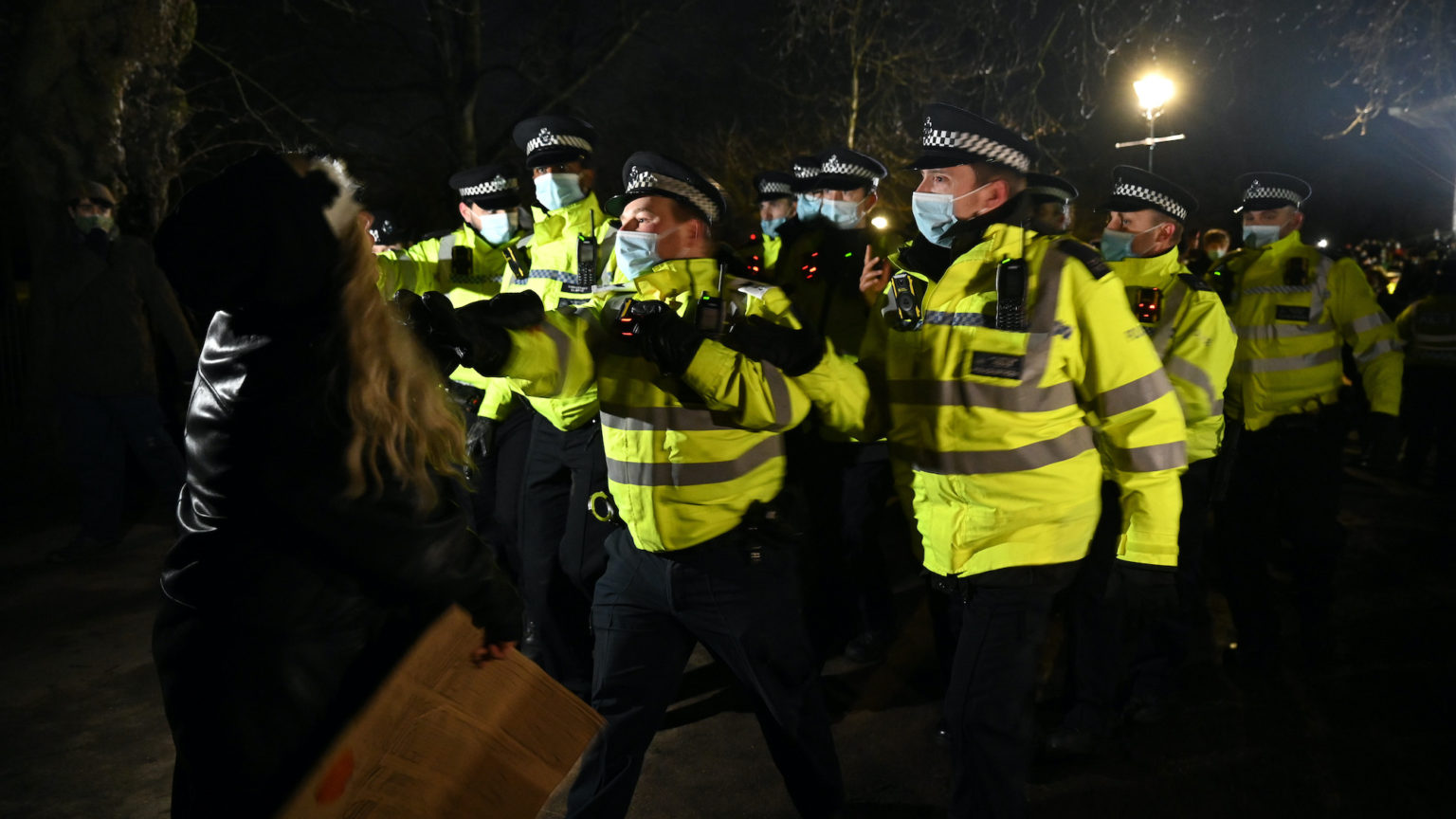The right to protest could be lost forever
Lockdown has emboldened the state to trample over our most basic freedoms.

Want to read spiked ad-free? Become a spiked supporter.
The Police, Crime, Sentencing and Courts Bill has its first debate in parliament this week. The bill has been widely condemned as an attack on freedom of assembly and protest. Its passage through parliament follows the heavy-handed policing of the vigil for Sarah Everard on Clapham Common on Saturday night.
The bill seeks to amend the Public Order Act 1986 by expanding the circumstances in which the police can impose restrictions on demonstrations. The police will now be able to restrict protest where ‘the noise generated by persons taking part in the procession may result in serious disruption to the activities of an organisation in the vicinity of the procession’. Restrictions could also be imposed if the ‘noise generated by persons taking part… may result in the intimidation or harassment of persons of reasonable firmness’ or ‘may cause such persons to suffer serious unease, alarm or distress’. In other words, the police can intervene to stop a protest if there is even a risk that people in the vicinity could be upset by the noise.
The bill is obviously an egregious attack on the freedom to protest. The threshold for intervening against protestors will become absurdly low. As others have pointed out, the bill attacks the very purpose of demonstrations. Demonstrations are supposed to cause ‘upset’ and ‘unease’. It is hard to imagine how any protest could be effective under these restrictions.
It is also worth noting how the bill uses established legalese to justify the expansion of state power. The appeal to ‘harassment alarm and distress’ reflects the wording of Sections 4a and 5 of the 1986 Public Order Act, which has been used repeatedly by the police to criminalise speech in the past. When it comes to policing free expression, this bill certainly plays by an established playbook.
This proposed clampdown on protest is the government’s most blatant attempt to make certain aspects of the lockdown permanent. Some pro-lockdown commentators have tried to argue over the weekend that the Coronavirus Act contains no explicit, blanket ban on the right to protest. But this is academic. Citizens have already been handed huge fines for organising protests. Earlier this month, a nurse was fined £10,000 for protesting against the government’s one per cent pay rise for NHS workers. Anti-lockdown protesters have been arrested, prosecuted and fined for organising and attending demonstrations throughout the pandemic. Now, with this bill, the government is attempting to put this power to police protest on a permanent statutory footing.
We should hardly be surprised. Those sceptical of the lockdown were never rallying against the restrictions for the sake of it. We recognised that it was dangerous to hand the state such untrammeled power, because it sets a dangerous precedent. Can we really be surprised that a government which has previously sought to make ‘mingling’ illegal now feels emboldened to permanently ban protests? This bill gives a strong indication that the government is seeking to turn some ‘emergency powers’ into permanent incursions on our civil liberties.
But it is not just the government at fault here. The total abandonment of civil liberties by the opposition, civil society and swathes of the commentariat since the onset of the pandemic has created the conditions for this draconian lawmaking.
We can only hope that this bill serves as a wake-up call. It is now clear that unless we push back against the lockdown, there is a real risk that this loss of freedom will be made permanent. We must now make the case for freedom in the strongest possible terms. We have to protest against the anti-protest bill.
Luke Gittos is a spiked columnist and author. His latest book, Human Rights – Illusory Freedom: Why We Should Repeal the Human Rights Act, is published by Zero Books. Order it here.
Picture by: Getty.
Who funds spiked? You do
We are funded by you. And in this era of cancel culture and advertiser boycotts, we rely on your donations more than ever. Seventy per cent of our revenue comes from our readers’ donations – the vast majority giving just £5 per month. If you make a regular donation – of £5 a month or £50 a year – you can become a and enjoy:
–Ad-free reading
–Exclusive events
–Access to our comments section
It’s the best way to keep spiked going – and growing. Thank you!











Comments
Want to join the conversation?
Only spiked supporters and patrons, who donate regularly to us, can comment on our articles.